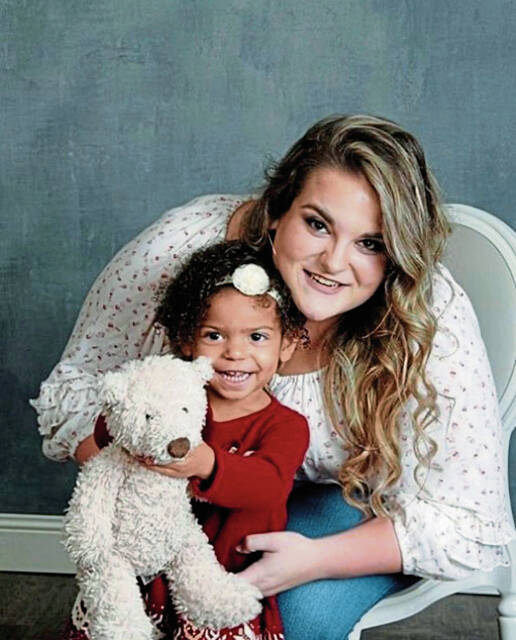At 293 pounds, Stormie Fish couldn’t carry her toddler from the parking lot at Northmoreland Park in Allegheny Township into the 2019 Labor Day festival.
“By the time we got to the top, I was hyperventilating,” said Fish, 26, of Vandergrift. “I fell to the ground and sobbed.
“How would I protect my child if I couldn’t take care of myself?”
Fish, a paraprofessional at Kiski Area School District, tried weight loss medication. When pandemic shutdowns interrupted medical supply chains, her urge to overeat returned.
Fish connected with an Allegheny Health Network physician in 2020 and underwent gastric bypass, or Roux-en-Y, surgery.
In five years, she has lost half her body weight, maintaining a healthy range between 148 and 152 pounds.
Her results support a new study by Highmark Health researchers that show bariatric weight loss surgery is more effective long-term than the class of medicines known as GLP-1s.
More commonly known as Ozempic, Mounjaro, Wegovy, Zepbound and others, the drugs have flooded the market in recent years, with user numbers up 600% since 2019, according to nonprofit FAIR Health.
But for the 40% of U.S. adults who are considered obese, surgery gives them a better chance at greater weight loss at lower ongoing costs, according to the Highmark study.
Key findings include an 18% cost savings with surgery compared to medications, amounting to about $12,000 over a two-year period. The savings are due mostly to sustained pharmacy costs associated with GLP-1s.
Data also showed that for patients with a Body Mass Index (BMI) of 40 or higher, bariatric surgery led to nearly three times as much weight loss as medications.
Published in the Journal of the American Medical Association, the study examined data from Highmark Health Plan insurance claims and Allegheny Health Network medical records from 2018 to 2023. It included more than 30,450 patients.
Tyson Barrett, manager of research analytics at Highmark Health Research Institute, said the findings highlight the potential for bariatric surgery to offer a more durable and economically sound solution for those seeking to reclaim their health.
The findings are in line with other studies, such as one published by the National Institutes of Health that found the cost of ongoing use of GLP-1s surpasses the cost of gastric bypass in less than a year. Even the most affordable drug option, Byetta, became more expensive than surgery after about a year and a half, the study showed.
As with any surgery, gastric bypass is not altogether without risks.
Short-term complications can include infection and gastrointestinal leaks, according to the Mayo Clinic.
Longer term risks of weight-loss surgery vary depending on the procedure. They can include gallstones, malnutrition, low blood sugar, hernias and dumping syndrome, a condition that leads to diarrhea, flushing, lightheadedness and vomiting.
Weight regain is also a risk post-surgery but an equal concern after discontinuing weight-loss medication. It happened quickly for Fish, who battled obesity since childhood.
“I saw the immediate weight gain while I was waiting for my medication to be refilled,” said. “You miss a dose and you’re up 6 pounds. To me, surgery was a more permanent change.
“No matter if I wanted to shove that cheeseburger down my throat, it wasn’t gonna happen when my stomach was only two ounces.”
Fed up with hearing people say that surgery was the easy way out, Fish insists it is a tool that still requires people to change their lifestyle.
“This was a question of whether I was going to save myself or not,” she said.
Shedding the weight has meant healing from associated conditions that included insulin resistance, PCOS and endometriosis, Fish said. She no longer ingests a buffet of medication to treat them. Fish also said her A1C (sugar) levels are no longer “out of whack.”
The Highmark Health study specifically looked at the costs and clinical side effects of surgery versus medications to manage class II and class III obesity, as defined by the Centers for Disease Control and Prevention.
The agency classifies adults 20 or older with a BMI of 35 to 39.9 as class II and a BMI of 40 or more as class III, or severe.
Dr. George Eid, chair of the AHN Bariatric and Metabolic Institute, said projections indicate that half of the U.S. adult population will have obesity by 2030.
The study is vital moving forward, he said, to determine which weight loss treatment best serves different patients.
“Surgery and medications are both effective tools,” Eid said. “But not everyone who has extra weight responds the same way to a treatment.”
Obesity is a disease, Eid said. Once weight become extreme, the body resists efforts to shed pounds.
“It’s like swimming against the current,” he said.
The value of the study is that it offers real-world data with clinical data, illustrating how much money is being spent and the specific health outcomes.
“Everyone who takes medication is not going to melt the weight off, even if their neighbor is having that result,” Eid said. “This study is extremely important to determine individual benefits.”
Five years after surgery, Fish said, she finally feels comfortable in her skin.
She has gone from a size 3XL to a small and said “all eyes are no longer on me. I’m just another person in the room.”
Being overweight for as long as she can remember, Fish said she stopped stepping on the scale at 293 pounds.
She credits her daughter, Sunnie, for spurring her surgery decision.
“My daughter needed me to be the best version of me that I could be,” she said. “If she wants to go swim, we can do it now. Or walk miles and miles at Disney. Whatever it is, we’re living a better life because of the decision.”
Tawnya Panizzi is a TribLive reporter. She joined the Trib in 1997. She can be reached at tpanizzi@triblive.com.




